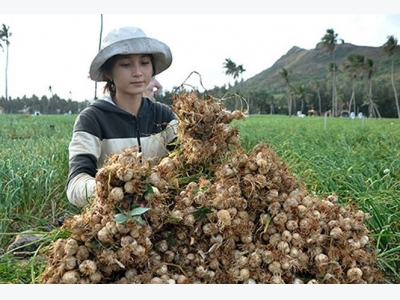Japanese garlic may overtake Ly Son garlic fields on Ly Son island

With the growing of Japanese elephant garlic on Ly Son Island, Ly Son garlic, a well-known brand, will be threatened, scientists say.
Ly Son garlic is well known brand
The Quang Ngai People’s Committee has OK’ed carrying out research to prepare for the cultivation of Japanese garlic on Ly Son Island.
Tadashi Yoshii, CEO of CAN Holdings from Japan, at a working session with Quang Ngai’s deputy chair Dang Van Minh, said the elephant garlic variety brings high yield of 4-5 tons per hectare. Each kilogram of the garlic is sold at VND180,000 in Japan.
Le Tien Dung, a renowned agronomist, said he was surprised when hearing the news that the local authorities allowed an exotic garlic species which could be a rival to native garlic.
Ly Son garlic, especially ‘toi co don’ as called by local people, is a specialty famous in Vietnam and the world which can be grown only on Ly Son with specific natural conditions. Ly Son’s people selected the precious variety after many generations.
Ly Son garlic, especially ‘toi co don’ as called by local people, is a specialty famous in Vietnam and the world which can be grown only on Ly Son with specific natural conditions.
According to Dung, toi co don, which is very valuable, priced at VND2-3 million per kilogram, is one of the best varieties which needs to be protected for development.
“Ly Son garlic will lose its position because it cannot compete with the Japanese garlic which has higher yield,” Dung warned.
“The Japanese garlic could be grown in other localities, except Ly Son. If Ly Son garlic disappears, our next generations will no longer have precious produce,” he said, adding that it is difficult to build up a brand.
The scientist went on to say that Vietnam needs to learn a lesson from the invasion of exotic plant varieties. An Cuu rice variety is an example.
“With the limited land fund in Ly Son, Ly Son garlic should be the only garlic variety to be grown there,” he concluded.
An expert from the Vietnam Agriculture Academy commented that importing foreign varieties is ‘in fashion’ because people think foreign varieties are always better than Vietnamese.
He said that Japanese experts with whom he worked in the past once issued a warning about Vietnam’s massive import of foreign varieties, though Vietnam has very good ones.
In developed countries, gene funds are considered invaluable assets. In Vietnam, provincial leaders pay inappropriate attention to the issue, but only care about short term economic benefits.
Plant varieties can only be brought to Vietnam after they are tested by the Ministry of Agriculture and Rural Development (MARD) and accepted by localities. However, it appears that investors ignored the required steps.
Có thể bạn quan tâm
 Vietnam exports 3.5 billion USD worth of coffee in 2018
Vietnam exports 3.5 billion USD worth of coffee in 2018 Vietnam exported more than 1.8 million tonnes of coffee worth some 3.54 billion USD in 2018, year-on-year rises of 20 percent and 1.2 percent respectively.
 Cashew sector seeks ways to navigate through difficulties
Cashew sector seeks ways to navigate through difficulties Vietnam sustained its position as the world’s leading cashew processor and exporter in 2018, yet the country still suffered from certain losses
 Investment in fruit, vegetable processing surges as companies realise potential
Investment in fruit, vegetable processing surges as companies realise potential Fruit and vegetable exports, which have been growing at around 15 per cent annually for the past five years, are a highly attractive business activity
 Vietnam targets 6.5 million tonnes of rice exports this year
Vietnam targets 6.5 million tonnes of rice exports this year The Ministry of Agriculture and Rural Development (MARD) has set a goal to export around 6.5 million tonnes of rice worth a total USD3 billion this year.
 Hoa Binh: Yen Bong commune promotes breeding of Lac Thuy chicken brand
Hoa Binh: Yen Bong commune promotes breeding of Lac Thuy chicken brand In the past 3 - 4 years, locals in Yen Bong commune of Lac Thuy district have expanded the scale of facilities for developing the chicken raising